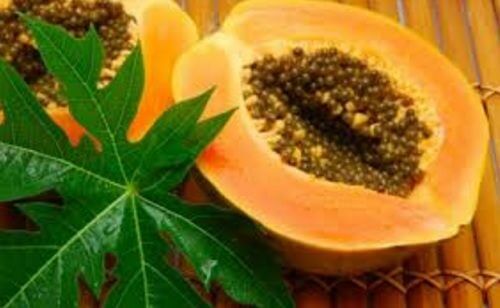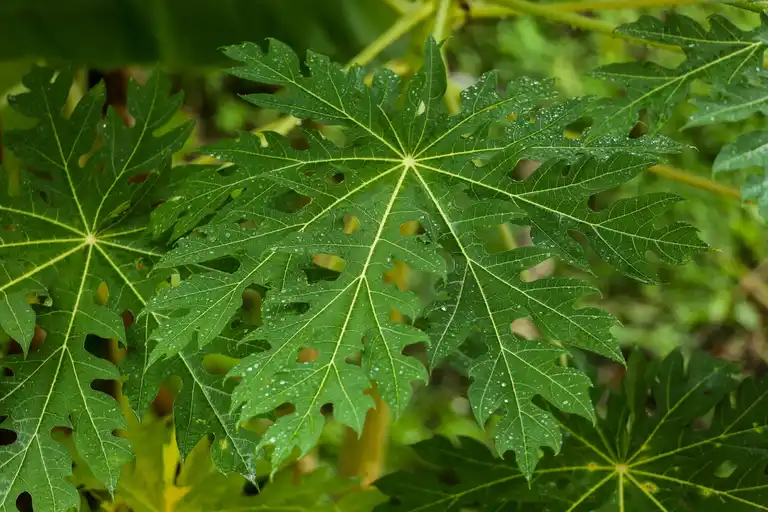13 Health Benefits of Papaya Leaves


Reviewed and approved by Doctor Carlos Fabián Avila
The health benefits of papaya are well-known as it has a high antioxidant, vitamin, mineral, and digestive enzyme content. These components are essential for a healthy diet. However, papaya leaves also have some interesting benefits for your health, according to this study, conducted by the Colombian Journal of Animal Science.
Unfortunately, many people don’t know about the properties of papaya leaves which is why we’re going to talk about them here. In fact, after reading this article, you may find you want to consider including them in your own diet.
1. Papaya leaves fight indigestion

According to a 2013 study conducted by the Research Center of the International Scientific Group of Preventative Medicine, papaya leaves can improve digestive problems like infections, stomachache, and heartburn. However, more studies would be needed to confirm their beneficial effects on the digestive tract.
Their enzymes protect the entire digestive system from the mouth to the colon and help proteins and carbohydrates break down naturally to relieve the acid that forms in the intestine. That’s why various studies recommend it for people who have trouble digesting protein.
You might also like to read: Detox Your Body with Papaya and Pineapple
2. They decrease swelling caused by dengue fever
Papaya leaves contain enzymes that help reduce the swelling in the body. They can also lighten the effects of the fever, pain, and flu associated with dengue fever. A study conducted by the Medical College of Dharpur, India, confirmed both the efficacy and safety of papaya leaves for treating this illness.
- Dengue fever is caused by mosquito bites from mosquitoes with the virus. It starts with a high and sudden fever (that can reach up to 105 °F) between four and seven days after infection.
- Two to five days after the fever starts, a red, flat rash appears on most of the body. Later, a second rash develops, which resembles that of measles.
- People infected with dengue fever can experience an increased sensitivity of the skin and feel a great deal of discomfort.
If you experience any of these symptoms, we recommend that you go to your doctor. You can try papaya leaf tea along with any prescribed treatment.
3. They help to deal with gluten intolerance
Papaya is a great fruit for people suffering from celiac disease, according to certain studies like this one conducted by Columbia University (USA).
If your doctor has told you that you’re gluten intolerant, we recommend drinking tea made with papaya leaves and visiting a nutritionist to make the necessary changes in your diet.
4. They could help prevent cancer
While papaya leaves don’t necessarily fight cancer, the antioxidants in papaya leaves can help the body fight off certain diseases.
However, a study conducted by Virginia State University (USA) found that black papaya seeds could help prevent the development of malignant prostate cancer cells.
5. They help reduce carbs and sugar addiction
It’s thought that drinking papaya leaf tea could reduce carbs and sugar addiction. While there isn’t yet any scientific evidence to back up this specific claim, like other fruits, papaya is a good substitute for processed food.
This addiction is a serious problem that can cause you to binge eat, which negatively affects your health.
6. They may combat acne
Acne is a big problem for both adolescents and adults with hormonal issues. If you suffer from acne and have tried everything with no success, try these leaves. According to a study published in the International Journal of Pharmaceutical Sciences and Research, they could work well as an anti-acne remedy.
- To combat acne, prepare a mask with papaya leaves mixed with a little water.
- Blend the leaves and water to create a paste.
- Apply the paste to your skin and leave it on for 15 minutes.
- Do this periodically for the best results.
7. They improve the health of your hair
We’re used to seeing papaya as an ingredient in many beauty products. However, a recent study shows that papaya leaves also contain many nutrients that can make your hair shiny and strong. The study also highlights the other health benefits of papaya.
Prepare an infusion of papaya leaves and add it to your shampoo. Then, wash your hair as usual.
You might also like to read: Eat a Slice of Papaya Every Day for These Benefits
8. Papaya leaves are laxatives
We already know that papaya is an excellent laxative. If you don’t like it as a fruit, a papaya leaf tea can be beneficial for constipation due to its high fiber content.
9. They help reduce period pains
You can drink papaya leaf juice several times a day to relieve cramps and period pains. That’s because the leaves have analgesic properties.
If you have hormonal or uterine fibroid problems, your menstrual periods are likely to be painful. In this case, try papaya leaf tea as it may make your periods more bearable. However, consult your doctor first.
10. They have anti-aging properties
Thanks to their numerous anti-oxidants, papaya leaves can be beneficial for your skin. You can make your own skin cream with them or drink the tea.
11. They can increase your appetite

Certain illnesses and medications can make you lose your appetite. According to this study, papaya leaf tea could help bring it back.
12. They strengthen your immune system
As we mentioned earlier, papaya leaves can help strengthen your immune system in the face of many different diseases like dengue fever. A study conducted by BMC Complementary and Alternative Medicine also highlights their effectiveness against this illness.
13. They prevent pain and reduce inflammation
Papaya leaves are usually soaked in hot water and applied to the skin to relieve muscle and joint pain. They also promote wound healing and are useful in the treatment of rheumatic conditions thanks to their anti-inflammatory, vasodilator, and antioxidant effects, according to some studies.
Now that you know about the properties of papaya leaves, you might want to try papaya leaf tea regularly and start enjoying its health benefits.
All cited sources were thoroughly reviewed by our team to ensure their quality, reliability, currency, and validity. The bibliography of this article was considered reliable and of academic or scientific accuracy.
- Abidah, S. N., Hadisaputro, S., Runjati, R., et al. (2017). Effect of carica papaya L leaf on menstrual pain and prostaglandin level in adolescent with primary dysmenorrhea: A true experiment. Belitung Nursing Journal, 3(3), 198-204. Disponible en: https://www.belitungraya.org/BRP/index.php/bnj/article/view/96
- Ahmad, N., Fazal, H., Ayaz, M., Abbasi, B. H., Mohammad, I., & Fazal, L. (2011). Dengue fever treatment with Carica papaya leaves extracts. Asian Pacific journal of tropical biomedicine, 1(4), 330-333. Disponible en: https://www.ncbi.nlm.nih.gov/pmc/articles/PMC3614241/
- Anjum, V., Arora, P., Ansari, S., et al. (2017). Antithrombocytopenic and immunomodulatory potential of metabolically characterized aqueous extract of Carica papaya leaves. Pharmaceutical biology, 55(1), 2043-2056. Disponible en: https://www.ncbi.nlm.nih.gov/pmc/articles/PMC6130488/
- Baskaran, C., Velu, S. & Kumaran, K. (2012). The efficacy of Carica papaya leaf extract on some bacterial and a fungal strain by well diffusion method. Asian Pacific Journal of Tropical Disease, 2, 658-662. Disponible en: https://www.sciencedirect.com/science/article/abs/pii/S2222180812602394
- Chávez, P., González, T., Rodríguez, I., et al. (2011). Antifungal activity in ethanolic extracts of Carica papaya L. cv. Maradol leaves and seeds. Indian journal of microbiology, 51(1), 54-60. Disponible en: https://pubmed.ncbi.nlm.nih.gov/22282629/
- Hariono, M., Julianus, J., Djunarko, I., et al. (2021). The future of Carica papaya Leaf extract as an herbal medicine product. Molecules, 26(22), 1-20. Disponible en: https://www.ncbi.nlm.nih.gov/pmc/articles/PMC8622926/
- Juárez, I., Díaz, J., Ble, J., et al. (2012). Hypoglycemic effect of Carica papaya leaves in streptozotocin-induced diabetic rats. BMC complementary and alternative medicine, 12(1), 1-11. Disponible en: https://www.ncbi.nlm.nih.gov/pmc/articles/PMC3551835/
- Lim, X., Chan, J., Japri, N., et al. (2021). Carica papaya L. Leaf: a systematic scoping review on biological safety and herb-drug interactions. Evidence-Based Complementary and Alternative Medicine, 2021. Disponible en: https://www.ncbi.nlm.nih.gov/pmc/articles/PMC8121580/
- Maurer, G. (s.f.). Frutas que ayudan a la digestión. Asociación de Celiacos del Perú. Disponible en: https://celiacosperu.org/enzimasyfrutas.html#:~:text=Asociaci%C3%B3n%20de%20Celiacos%20y%20Sensibles%20al%20Gluten%20del%20Per%C3%BA,-Frutas%20que%20Ayudan&text=La%20papaya.,verde%20espec%C3%ADficamente%20en%20el%20l%C3%A1tex.
- Muss, C., Mosgoeller, W. & Endler, T. (2013). Papaya preparation (Caricol®) in digestive disorders. Neuroendocrinology Letters, 34(1), 38-46. Disponible en: https://pubmed.ncbi.nlm.nih.gov/23524622/
- Nirosha, N. & Mangalanayaki, R. (2013). Antibacterial activity of leaves and stem extract of Carica papaya L. Internatinal Journal of Advances in Pharmacy, Biology and Chemestry, 2(3), 473-476. Disponible en: http://www.ijapbc.com/files/08-2240.pdf
- Rojo, I. (2013). Carica papaya: una planta con efecto terapéutico. Horizonte sanitario, 12(2), 35-36. Disponible en: https://www.redalyc.org/pdf/4578/457845144004.pdf
- Singh, S., Kumar, S., Mathan, S., et al. (2020). Therapeutic application of Carica papaya leaf extract in the management of human diseases. DARU Journal of Pharmaceutical Sciences, 28(2), 735-744. Disponible en: https://www.ncbi.nlm.nih.gov/pmc/articles/PMC7704890/
- Sharma, A., Sharma, R., Sharma, M., et al. (2022). Carica papaya L. Leaves: Deciphering Its Antioxidant Bioactives, Biological Activities, Innovative Products, and Safety Aspects. Oxidative Medicine and Cellular Longevity, 2022. Disponible en: https://www.ncbi.nlm.nih.gov/pmc/articles/PMC9203216/
- Vij, T., & Prashar, Y. (2015). A review on medicinal properties of Carica papaya Linn. Asian Pacific Journal of Tropical Disease, 5(1), 1-6. Disponible en: https://www.sciencedirect.com/science/article/abs/pii/S2222180814606174
This text is provided for informational purposes only and does not replace consultation with a professional. If in doubt, consult your specialist.








